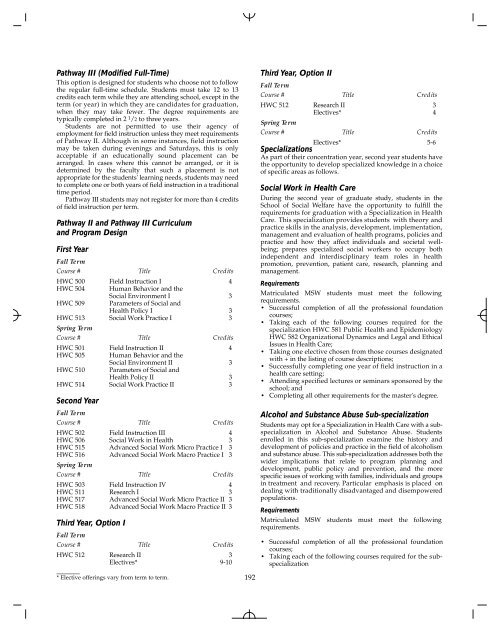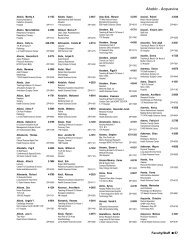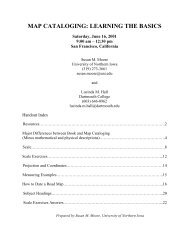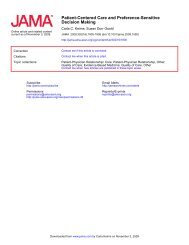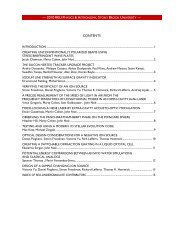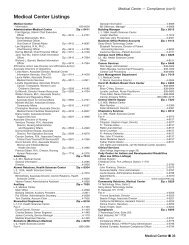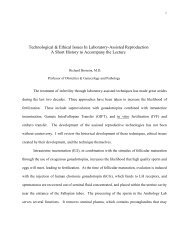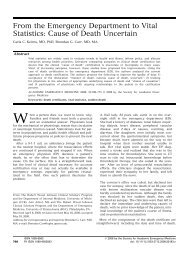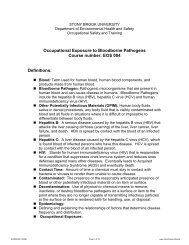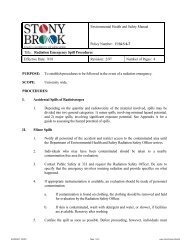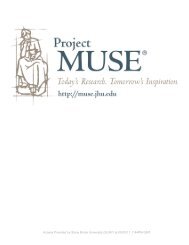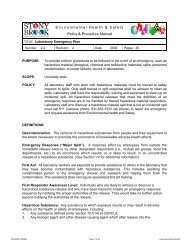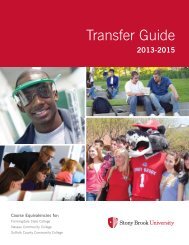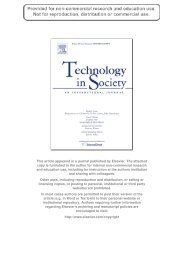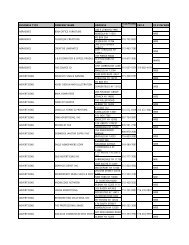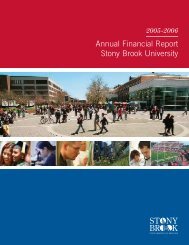School of Social Welfare - Stony Brook University
School of Social Welfare - Stony Brook University
School of Social Welfare - Stony Brook University
Create successful ePaper yourself
Turn your PDF publications into a flip-book with our unique Google optimized e-Paper software.
Pa t h way III (Modified Full-Ti m e )<br />
This option is designed for students who choose not to follow<br />
the regular full-time schedule. Students must take 12 to 13<br />
c redits each term while they are attending school, except in the<br />
term (or year) in which they are candidates for graduation,<br />
when they may take fewer. The degree re q u i rements are<br />
typically completed in 2 1 /2 to three years.<br />
Students are not permitted to use their agency <strong>of</strong><br />
employment for field instruction unless they meet re q u i re m e n t s<br />
<strong>of</strong> Pathway II. Although in some instances, field instru c t i o n<br />
may be taken during evenings and Saturdays, this is only<br />
acceptable if an educationally sound placement can be<br />
arranged. In cases where this cannot be arranged, or it is<br />
determined by the faculty that such a placement is not<br />
a p p ropriate for the students' learning needs, students may need<br />
to complete one or both years <strong>of</strong> field instruction in a traditional<br />
time period.<br />
Pathway III students may not register for more than 4 cre d i t s<br />
<strong>of</strong> field instruction per term.<br />
Pa t h way II and Pa t h way III Curriculum<br />
and Pro g ram Design<br />
First Ye a r<br />
Fall Te r m<br />
Course # Ti t l e C re d i t s<br />
HWC 500 Field Instruction I 4<br />
HWC 504 Human Behavior and the<br />
<strong>Social</strong> Environment I 3<br />
HWC 509 Parameters <strong>of</strong> <strong>Social</strong> and<br />
Health Policy I 3<br />
HWC 513 <strong>Social</strong> Work Practice I 3<br />
Spring Te r m<br />
Course # Ti t l e C re d i t s<br />
HWC 501 Field Instruction II 4<br />
HWC 505 Human Behavior and the<br />
<strong>Social</strong> Environment II 3<br />
HWC 510 Parameters <strong>of</strong> <strong>Social</strong> and<br />
Health Policy II 3<br />
HWC 514 <strong>Social</strong> Work Practice II 3<br />
Second Ye a r<br />
Fall Te r m<br />
Course # Ti t l e C re d i t s<br />
HWC 502 Field Instru c t i o n I I I 4<br />
HWC 506 <strong>Social</strong> Work in Health 3<br />
HWC 515 Advanced <strong>Social</strong> Work Micro Practice I 3<br />
HWC 516 Advanced <strong>Social</strong> Work Macro Practice I 3<br />
Spring Te r m<br />
Course # Ti t l e C re d i t s<br />
HWC 503 Field Instruction IV 4<br />
HWC 511 R e s e a rch I 3<br />
HWC 517 Advanced <strong>Social</strong> Work Micro Practice II 3<br />
HWC 518 Advanced <strong>Social</strong> Work Macro Practice II 3<br />
Th i rd Ye a r, Option I<br />
Fall Te r m<br />
Course # Ti t l e C re d i t s<br />
HWC 512 R e s e a rch II 3<br />
E l e c t i v e s * 9 - 10<br />
________<br />
* Elective <strong>of</strong>ferings vary from term to term.<br />
192<br />
Th i rd Ye a r, Option II<br />
Fall Te r m<br />
Course # Ti t l e C re d i t s<br />
HWC 512 R e s e a rch II 3<br />
E l e c t i v e s * 4<br />
Spring Te r m<br />
Course # Ti t l e C re d i t s<br />
E l e c t i v e s * 5 - 6<br />
S p e c i a l i z a t i o n s<br />
As part <strong>of</strong> their concentration year, second year students have<br />
the opportunity to develop specialized knowledge in a choice<br />
<strong>of</strong> specific areas as follows.<br />
<strong>Social</strong> Work in Health Care<br />
During the second year <strong>of</strong> graduate study, students in the<br />
<strong>School</strong> <strong>of</strong> <strong>Social</strong> We l f a re have the opportunity to fulfill the<br />
re q u i rements for graduation with a Specialization in Health<br />
C a re. This specialization provides students with theory and<br />
practice skills in the analysis, development, implementation,<br />
management and evaluation <strong>of</strong> health programs, policies and<br />
practice and how they affect individuals and societal wellbeing;<br />
pre p a res specialized social workers to occupy both<br />
independent and interdisciplinary team roles in health<br />
p romotion, prevention, patient care, re s e a rch, planning and<br />
m a n a g e m e n t .<br />
R e q u i re m e n t s<br />
Matriculated MSW students must meet the following<br />
re q u i re m e n t s .<br />
• Successful completion <strong>of</strong> all the pr<strong>of</strong>essional foundation<br />
c o u r s e s ;<br />
• Taking each <strong>of</strong> the following courses re q u i red for the<br />
specialization HWC 581 Public Health and Epidemiology<br />
HWC 582 Organizational Dynamics and Legal and Ethical<br />
Issues in Health Care ;<br />
• Taking one elective chosen from those courses designated<br />
with + in the listing <strong>of</strong> course descriptions;<br />
• Successfully completing one year <strong>of</strong> field instruction in a<br />
health care setting;<br />
• Attending specified lectures or seminars sponsored by the<br />
school; and<br />
• Completing all other re q u i rements for the master's degre e .<br />
Alcohol and Substance Abuse Sub-specialization<br />
Students may opt for a Specialization in Health Care with a subspecialization<br />
in Alcohol and Substance Abuse. Students<br />
e n rolled in this sub-specialization examine the history and<br />
development <strong>of</strong> policies and practice in the field <strong>of</strong> alcoholism<br />
and substance abuse. This sub-specialization addresses both the<br />
wider implications that relate to program planning and<br />
development, public policy and prevention, and the more<br />
specific issues <strong>of</strong> working with families, individuals and gro u p s<br />
in treatment and re c o v e r y. Particular emphasis is placed on<br />
dealing with traditionally disadvantaged and disempowere d<br />
populations.<br />
R e q u i re m e n t s<br />
Matriculated MSW students must meet the following<br />
re q u i re m e n t s .<br />
• Successful completion <strong>of</strong> all the pr<strong>of</strong>essional foundation<br />
c o u r s e s ;<br />
• Taking each <strong>of</strong> the following courses re q u i red for the subs<br />
p e c i a l i z a t i o n


